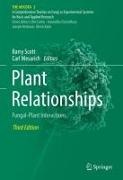Share
Fr. 273.00
Mesarich, Carl Mesarich, Barry Scott
Plant Relationships - Fungal-Plant Interactions
English · Hardback
Shipping usually within 2 to 3 weeks (title will be printed to order)
Description
This fully revised 3rd edition provides a comprehensive overview of the biology of fungi associated with plants. Since the publication of the 2nd Edition in 2009, tremendous new knowledge has been gained in the field of fungal-plant interactions, which is reflected in the contributions of this book.
World-leading scientists in the field provide authoritative insights into fungal-plant interactions covering the following main topics:
- Mutualistic and pathogenic fungal-plant interactions in natural and agricultural ecosystems
- Sensing and signalling in fungus-plant interactions
- Regulation of fungal gene expression and development
- Fungal genomes and evolution
- Global pandemics caused by fungal pathogens and their implications for food security
This volume will be of great interest to both specialists and generalists. It is an indispensable resource for researchers, lecturers and students in microbiology, mycology, and plant sciences, as well as agriculture and biotechnology.
List of contents
Part I. Pathogenic Fungus - Plant Interactions.- Modulation of Host Immunity and Development by Ustilago Maydis.- RNA Dialogues in Fungal-Plant Relationships.- The Role of Tox Effector Proteins in the Parastagonospora Nodorum-Wheat Interaction.- Part II. Mutualistic Fungus - Plant Interactions.- Genomes of Arbuscular Mycorrhizal Fungi.- Diversity of Seed Endophytes: Causes and Implications.- Lichens and Their Allies Past and Present.- Lichen Fungal Secondary Metabolites: Progress in the Genomic Era Towards Ecological Roles in the Interaction.- Part III. Sensing and Signalling in Fungus-Plant Interactions.- Regulation of Plant Infection Processes by MAP Kinase Pathways in Ascomycetous Pathogens.- Role of pH in the Control of Fungal MAPK Signalling and Pathogenicity.- Role of Volatile Organic Compounds in Establishment of the Trichoderma-Plant Interaction.- Part IV. Regulation of Fungal Gene Expression and Development.- Epigenetic Regulation of Fungal Genes Involved in Plant Colonization.- Toward Understanding the Role of Chromatin in Secondary Metabolite Gene Regulation in the Rice Pathogen Fusarium Fujikuroi.- The Rice Blast Fungus Magnaporthe Oryzae Uses a Turgor-Dependent, Septin-Mediated Mechanism to Invade Rice.- Role of Light in the Life Cycle of Botrytis Cinerea.- Part V. Genomes and Evolution.- Species of Zymoseptoria (Dothideomycetes) as a Model System to Study Plant Pathogen Genome Evolution.- Accessory Chromosomes of the Fusarium Oxysporum Species Complex and Their Contribution to Host Niche Adaptation.- Part VI. Global Pandemics and Food Security.- Global Landscape of Rust Epidemics by Puccinia Species: Current and Future Perspectives.- Magnaporthe oryzae and Its Pathotypes: A Potential Plant Pandemic Threat to Global Food Security.
About the author
Carl H. Mesarich was conferred his PhD in Biological Sciences from the University of Auckland, New Zealand, in 2012. Upon completion of his PhD, he spent four years as a postdoctoral scientist in the laboratories of Professor Pierre de Wit at Wageningen University in the Netherlands (2012-2014) and Associate Professor Matthew Templeton at the New Zealand Institute for Plant and Food Research (2015). Major highlights from his postdoctoral research included the identification of Avr5, an avirulence effector gene from the tomato leaf mold fungus, Cladosporium fulvum, as well as the characterization of an apoplastic effectorome for this fungus (published in Molecular Plant Microbe Interactions in 2014 and 2018, respectively). Since 2016, Dr. Mesarich has lead a research team at Massey University, New Zealand, where he is currently a Senior Lecturer in Plant Pathology, as well as an Associate Investigator for Bioprotection Aotearoa, a national Centre of Research Excellence. Much of his team's research focuses on understanding how the fungal pathogens C. fulvum and Venturia inaequalis (scab disease of apple), as well as the oomycete Phytophthora agathidicida (dieback disease of kauri), cause disease and/or trigger host immunity through the deployment of effector proteins, with the goal of informing disease resistance breeding or selection programs.
Report
"This edition has a mixture of chapters, some of which are broad in scope and so will be of interest to a wide range of mycologists, while others focus on particular cases. With regard to plant pathogens, there is a fascinating account of the role of extracellular RNAs in overcoming the species boundary between a fungus and plant host ... . Other contributions ... in our understanding of aspects of particular diseases, especially ones facilitated by genomic and genetic studies." (IMA Fungus, February 5, 2024)
Product details
| Assisted by | Mesarich (Editor), Carl Mesarich (Editor), Barry Scott (Editor) |
| Publisher | Springer, Berlin |
| Languages | English |
| Product format | Hardback |
| Released | 08.12.2022 |
| EAN | 9783031165023 |
| ISBN | 978-3-0-3116502-3 |
| No. of pages | 462 |
| Illustrations | XXII, 462 p. 70 illus., 62 illus. in color. |
| Series |
The Mycota |
| Subject |
Natural sciences, medicine, IT, technology
> Biology
> General, dictionaries
|
Customer reviews
No reviews have been written for this item yet. Write the first review and be helpful to other users when they decide on a purchase.
Write a review
Thumbs up or thumbs down? Write your own review.

